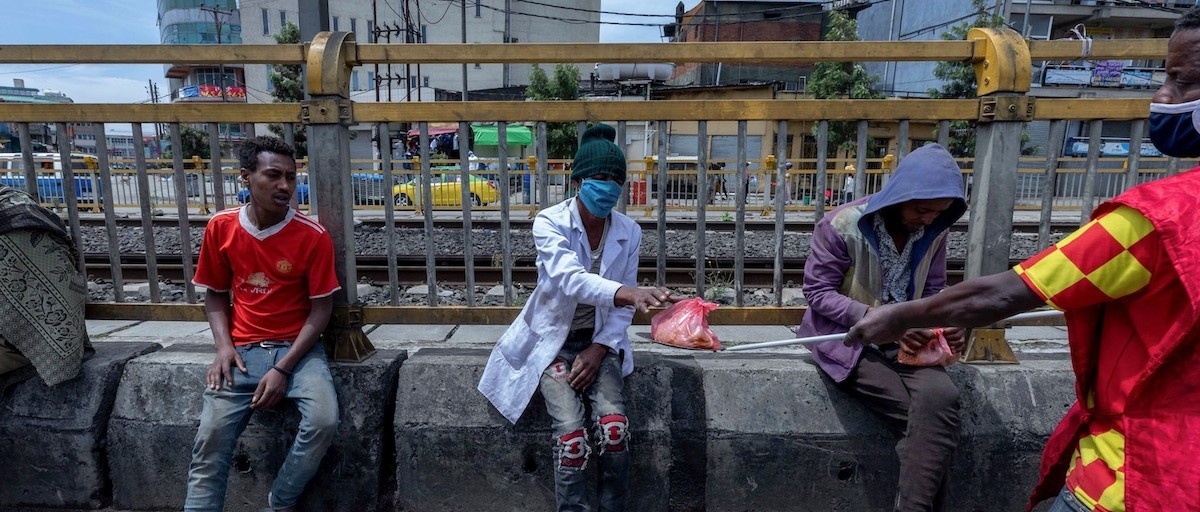
The Severe Effect of COVID-19 on Jobs for Migrants and Refugees
Albeit a slower start compared to European countries, COVID-19 has rapidly shown the long-term impact on both health and socioeconomic sectors in African countries. Vulnerable populations, especially migrants and refugees have experienced multiple disadvantages because of the swift imposed lockdown. Many migrants across the continent work in the informal sector, often have family members who rely on remittances, and are not eligible for government aid1. The impact of decreased remittances is, and threatens to be, devastating, for instance 40% of households are significantly dependent upon remittances in the Horn of Africa and thus reduction in remittance flow sent by the Somali diaspora will substantially increase food insecurity2. With an estimated migrant population of 4.2 million people in South Africa, migrants make up a large portion of the population yet are struggling with receiving appropriate government aid1. In South Africa non-essential services and production experienced immediate impact from lockdowns, including reduced hours worked and job losses3. The informal economy has been the most affected by the extended lockdown, farm workers and sectors where women predominate, such as domestic work, hospitality, clothing, retail, and informal employment have been subjected to job losses and income loss. Migrants, asylum seekers, and refugees often rely on work in these informal sectors and thus have struggled financially during the COVID crisis.
The effect of loss of income and jobs on the vulnerable population is multi-faceted. Households globally and on the African Continent often rely on remittances from migrant workers as a significant source of income. In 2019 US$715 billion was sent as remittances and US$551 billion of which supported 800 million households living in low- and middle-income countries2. The lockdown, returning of migrant workers, job losses and overall economic impact on business means falling remittances. The World Bank predicts that remittances to in North Africa and the Middle East will fall by 19.6% (reducing from US$47 billion to US$38 billion) and to Sub-Saharan Africa will fall by 23.1% (reducing from US$48 billion in 2019 to US$37 billion) in 2020. Additionally remittance from migrants working on the African continent was estimated to be US$14 billion in 2018, 4 a significant proportion of which is intra-African remittance, and this work and corresponding remittance in 2020 is severely at risk from the COVID crisis. A significant decrease in remittances for households can lead to difficulty meeting economic, social and health care needs. As a result of the crisis and lockdowns women face increased unpaid care work, with children home from school, there is an increased need for housework and emotional support4. Additionally, migrant women and refugees are more vulnerable to harassment and violence, 3 and gender-based violence has been on the rise during the lockdown. The lockdown has also increased the number of displaced people, it is estimated that over 1,400 people in Cape Town are displaced due to the rising cost of housing and are occupying closed-down buildings, such as hospitals4. Not only has migration for employment been reduced by the COVID crisis migration restrictions (IOM reported 25% reduction in number of people migrating for employment from or through North Africa to Europe) but countries have also returned migrant workers claiming that these workers may be spreading the virus, such as the almost 3000 Ethiopian workers, primarily with low income jobs, returned from the United Arab Emirates and Saudi Arabia in April 2020 with further returns expected4.
In positive news, the South African government has allowed Spaza shop owners to continue to work, if the business owner is a non-South African citizen. The business owner must have been lawfully admitted into the country and hold a valid passport or hold an asylum seeker permit and there is even allowance made to unregistered businesses to obtain temporary registration5. Although the South African government has not outlined distinct guidelines that support migrants, refugees, and asylum seekers, international organisations have increased action for aid. On April 30th, the United Nations in South Africa launched an emergency flash appeal for 136 million USD to support around 10 million people in need6. This funding is aimed at supporting people living with HIV, migrants and refugees, women and children who are affected by violence, as well as communities facing shortages of food and other essentials. Other organisations and coalitions are partnering with the UN and supporting communities regarding issues of medical care, shortages of food and fresh water, homelessness, and crowded housing, as well as loss of income6 and these include: C19 People’s Coalition and the COVID 19 Front, South African National AIDS council Civil Society Forums and the National Economic Development Council Community Constituency.
____________________________________
James Chapman & Felipa Schmidt
SIHMA SIHMA
Project Manager Research and Communication Intern
Sources
- https://issafrica.org/iss-today/covid-19-responses-in-africa-must-include-migrants-and-refugees
- https://www.weforum.org/agenda/2020/04/how-coronavirus-could-hit-the-billions-migrant-workers-send-home/
- https://www.ilo.org/global/topics/coronavirus/country-responses/lang--en/index.htm#ZA
- https://www.equinetafrica.org/sites/default/files/uploads/documents/EQUINET%20COVID%20brief4%20%201May2020.pdf
- https://www.iol.co.za/business-report/companies/government-to-allow-small-businesses-and-spaza-shops-to-operate-during-lockdown-46370673
- https://www.unaids.org/en/resources/presscentre/featurestories/2020/may/20200512_south-africa
Categories:
Tags:

